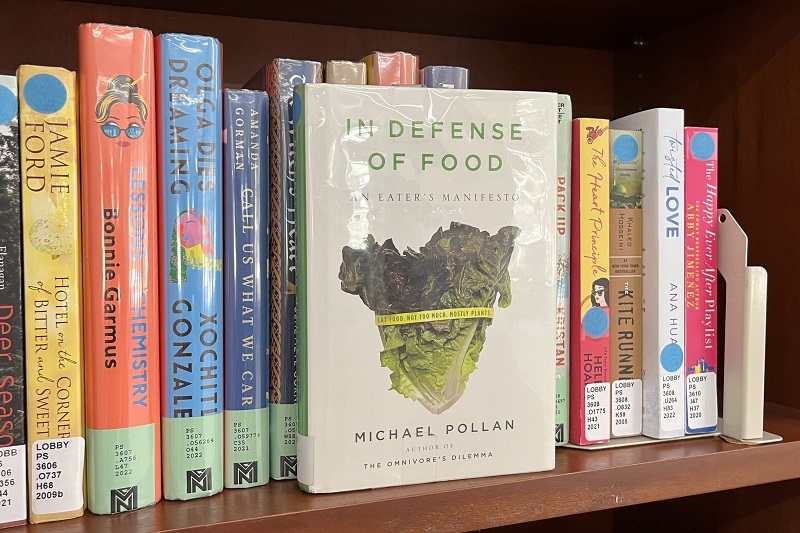University Libraries

Eat Food. Not Too Much. Mostly Plants.
By Camila Sánchez-González
Have you noticed that when you go to a grocery store, there seem to be aisles of products that our ancestors might not even recognize as food? Have you ever heard about the French paradox? Nutritionism? How about reductionist science? Well, I didn’t know any of these terms prior to reading this book.
When I was looking for a book to highlight the sustainability collection, I didn’t know where to start, but I knew I wanted to talk about food and nutrition — two of my passions. I passed by In Defense Of Food: An Eater’s Manifesto, by Michael Pollan, when skimming through the leisure reading collection on the first floor of Roesch Library as I usually do. The cover seemed very interesting to me. It was just a head of red leaf lettuce wrapped in a yellow twist-tie printed with the words “Eat Food. Not Too Much. Mostly Plants.”
This is essentially the secret — the overall message Pollan wants us to adopt in our daily lives and leave behind the high-calorie, high-sugar, highly processed Western diet.
That being said, when you think of food, what is the first thing that comes to mind? Is it something that you can find on the shelf? A home-cooked meal? An individual item? Or a fast food chain you like?
The answers might vary, and I think this is the most interesting finding from it all: Why do people have so many perceptions of food? Is it influenced by upbringing, education, culture, convenience, socioeconomic status? I rather think nowadays most of us don’t think about what we put in our bodies — how we nourish what is essentially our own living machines.
Given all these questions and doubts on what to believe and what to eat — or what not to eat — reading this book has opened a whole new set of questions of worry, but also of curiosity within my learner lens. This book calls its audience to action, to ask those questions about what we put into our bodies — how, why and where. It is an interesting concept, and I am excited to dive in more.
Based on Pollan’s research and suggestions, I have listed some key findings and practices one should adopt when improving our overall health.
Mostly Plants: What to Eat
- Eat mostly plants, especially leaves.
- You are what what you eat eats, too.
- If you have the space, buy a freezer.
- Eat foods grown well from healthy soils.
- Eat wild foods when you can.
- Be the kind of person that takes supplements.
- Eat more like the French. Or the Italians. Or the Japanese. Or the Indians. Or the Greeks.
- Regard nontraditional foods with skepticism.
- Don’t look for the “magic bullet” in the traditional diet.
- Have a glass of wine with dinner.
Not Too Much: How to Eat
- Pay more; eat less.
- Eat meals.
- Do all your eating at a table.
- Don’t get your fuel from the same place your car does.
- Try not to eat alone.
- Consult your gut.
- Eat slowly.
- Cook, and if you can, plant a garden.
Take the next step
- Borrow In Defense of Food: An Eater's Manifesto from the leisure reading collection.
- Check out our Sustainability Libguide for more reads and resources: Sustainability Libguide Books.
- Read about the Hanley Sustainability Institute.
- See who’s teaching about sustainability on campus.
Other titles by Michael Pollan
- Second Nature
- A Place of My Own
- The Botany of Desire
- The Omnivore’s Dilemma
— Camila Sánchez-González is the 2022-23 OhioLINK Luminaries intern in the University Libraries.
